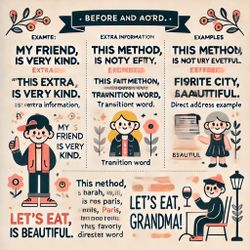Mar 8, 2025
How to Use Commas Before and After Words
1. Periods (.)
A period is used to end a complete sentence (a statement).
Example: I like coffee.
Example: She went to the store.
2. Commas (,)
A comma is used inside a sentence to separate ideas, make it easier to read, or clarify meaning.
Common uses of commas:
1. To separate items in a list
Example: I bought apples, bananas, and oranges.
2. Before conjunctions (and, but, so, or, etc.) in compound sentences
Example: I wanted to go out, but it started to rain.
3. After introductory words or phrases
Example: After the meeting, we went for lunch.
Example: Yes, I understand.
4. To separate extra information in a sentence
Example: My brother, who lives in London, is visiting us.

1. When adding extra (non-essential) information
Example: My brother, Ali, is a doctor.
(If you remove "Ali," the sentence still makes sense: My brother is a doctor.)
2. When using transition words or phrases
Example: This method, however, is not very effective.
Example: The results, in fact, were better than expected.
3. When using appositives (a phrase that renames a noun)
Example: My favorite city, Medina, is very peaceful.
4. When using direct address (talking to someone by name)
Example: I think, Yokii, that you are right.
Example: Let’s eat, Grandma! (← This comma is important! Without it, the sentence means something very different.)
1. When Adding Extra (Non-Essential) Information
Use commas before and after a word or phrase that gives extra details but is not necessary for the sentence’s main meaning.
Examples:
My best friend, Sarah, loves traveling.
The Eiffel Tower, one of the most famous landmarks in the world, is in Paris.
His car, a red Toyota, is parked outside.
Tip: If you remove the part inside commas, the sentence should still make sense.
---
2. When Using Transition Words or Phrases
Use commas before and after transition words like however, in fact, therefore, for example, etc.
Examples:
This method, however, is not very effective.
The test was difficult. The results, in fact, were worse than expected.
She is very talented. Her performance, for example, was incredible.
Common Transition Words That Need Commas:
however, therefore, in fact, for example, for instance, moreover, on the other hand, in conclusion, as a result
---
3. When Using Appositives (Renaming a Noun)
An appositive is a word or phrase that renames the noun next to it. It is set off by commas if it is extra information.
Examples:
My teacher, Mr. Ahmed, is very kind.
Medina, a beautiful city in Saudi Arabia, has a rich history.
His brother, a professional swimmer, won the competition.
---
4. When Using Direct Address (Speaking to Someone by Name)
Use commas before and after a person’s name when you address them directly.
Examples:
I think, Yokii, that you are improving your English.
Can you help me, Ali?
Let’s eat, Grandma! (← Very important! Without the comma, it sounds like we are eating Grandma!)
---
5. When Interrupting a Sentence (Parenthetical Expressions)
Some phrases interrupt the main sentence and need commas before and after.
Examples:
The project was, to be honest, a complete failure.
She will arrive, I think, at 5 PM.
The answer is, of course, correct.
Common Parenthetical Expressions:
I think, I believe, of course, in my opinion, to be honest, as you know
---
6. When Writing Dates and Places
Use commas to separate parts of a date or location.
Examples:
He was born on July 4, 1990, in New York, USA.
We moved to Jeddah, Saudi Arabia, last year.
---
7. When Using "Which" for Extra Information
If a phrase starting with which gives extra information, use commas.
Examples:
The book, which I borrowed from the library, is very interesting.
His phone, which is very old, stopped working.
---
Quick Test! (Try to Add Commas in These Sentences)
1. My father who is a doctor works at a hospital.
2. I was born on January 15 2000 in Riyadh Saudi Arabia.
3. My friend however doesn’t like coffee.
4. The capital of Japan Tokyo is very crowded.
5. Let’s eat Grandma!
By undefined
4 notes ・ 0 views
English
Elementary